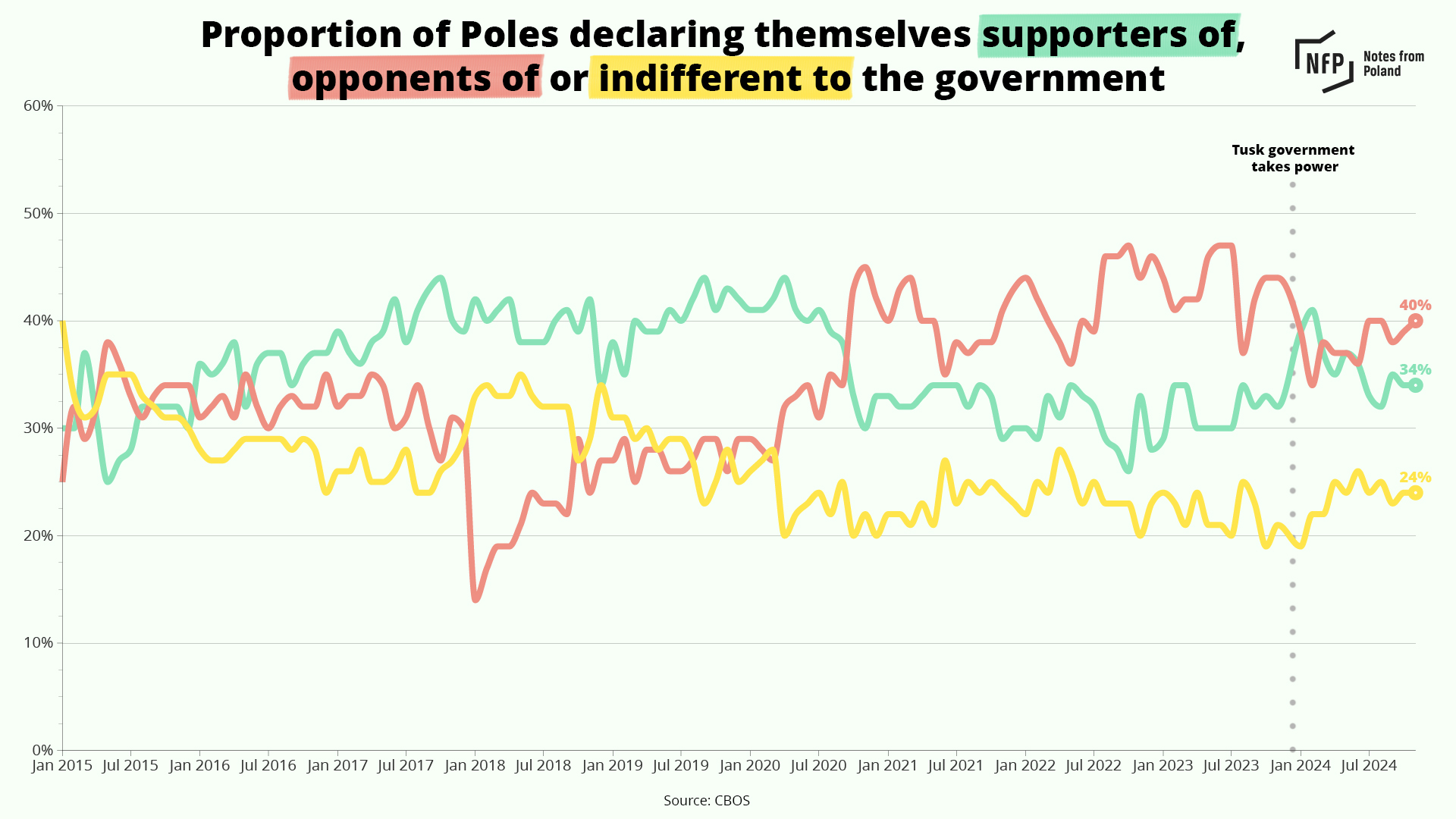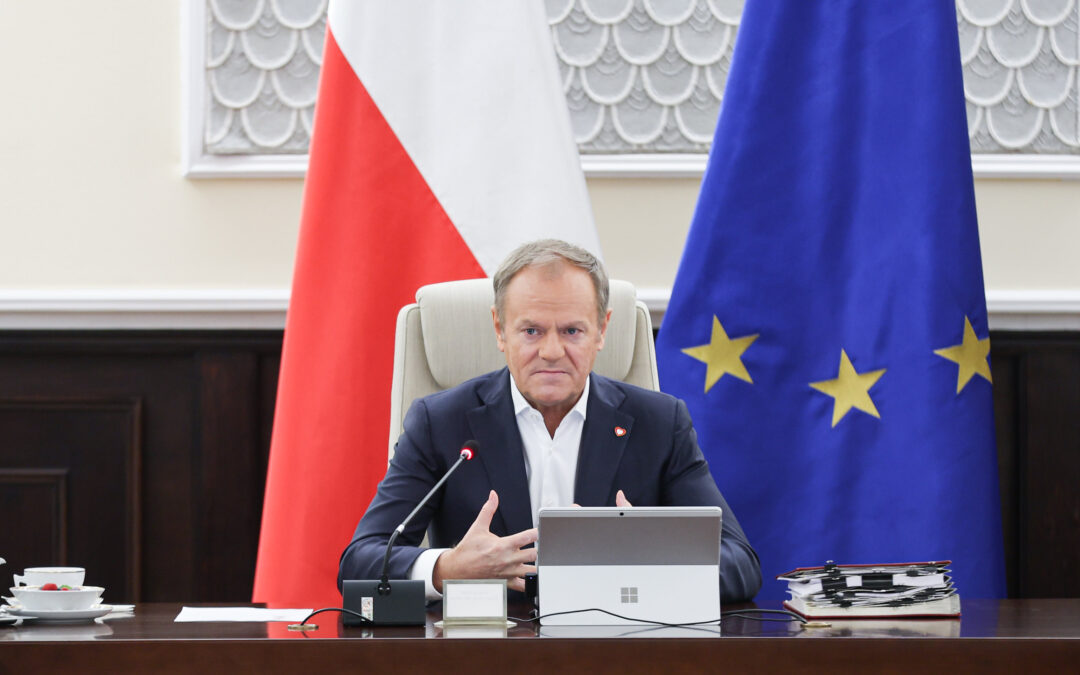Keep our news free from ads and paywalls by making a donation to support our work!

Notes from Poland is run by a small editorial team and is published by an independent, non-profit foundation that is funded through donations from our readers. We cannot do what we do without your support.
Polls conducted to mark one year since Prime Minister Donald Tusk took power have indicated that most Poles negatively assess the work of his government. Many feel their lives have become worse rather than better over that period, with women and young people particularly disappointed.
Tusk and his new ministers were sworn in exactly one year ago, marking the end of eight years of rule by the national-conservative Law and Justice (PiS) party. The new ruling coalition consists of Tusk’s centrist Civic Coalition (KO), the centre-right Third Way (Trzecia Droga) and The Left (Lewica).
A new poll by United Surveys for news website Wirtualna Polska found that just over half of the public, 51.8%, hold a negative opinion of the work done so far by Tusk’s government while 39.3% view it positively.
Among respondents who said they were supporters of neither the ruling coalition nor the opposition, positive sentiment was only 15% while negative views stood at 58%.
Czy po roku rządów Tuska Polakom żyje się lepiej? Sondaż dla RMF FM i "DGP" https://t.co/gRwcN3hOMZ
— Fakty RMF FM (@RMF24pl) December 13, 2024
Another poll by United Surveys for the Dziennik Gazeta Prawna daily and broadcaster RMF similarly found that 51.4% had a negative opinion of the government while 39.6% were positive. Among unaligned voters, positive sentiment was only 17.4% while negative views stood at 54.5%.
The survey also showed that the government had much lower positive sentiment among women (33%) than men (47%) and among 18-29 year-olds (17%) than older age groups (where the figure ranges between 47% and 57%).
That may reflect frustrations over the government’s failure to fulfil its promises to end Poland’s near-total abortion ban and improve LGBT+ rights, both of which were seen as major factors in motivating turnout among young people and women at last year’s elections.
Poland's government came to power exactly one year ago on a pledge to end the country's near-total abortion ban.
But that promise remains unfilled, leaving many women angry and disillusioned, write @AlicjaPtak4 and @Chrisatepaauwe https://t.co/q9w8NqP4mI
— Notes from Poland 🇵🇱 (@notesfrompoland) December 13, 2024
Meanwhile, in a poll by the Instytut Badań Pollster agency for the Super Express newspaper, Poles were asked: “How is your life one year after Donald Tusk’s new government took power?”
The largest proportion of respondents, 44%, said it was worse, while only 14% said it was better. Around one third (36%) said things were the same, while 6% were unsure.
Similar results were found in another poll by United Surveys for Dziennik Gazeta Prawna daily and RMF, which asked: “Is your life better than a year ago?” Only 13.6% said that it was better, while 37.5% claimed it was worse. A further 46.8% said there had been no change.
Monthly polling by state research agency CBOS found that in November, the proportion of Poles describing themselves as opponents of the government rose to 40%, compared to 34% who said they were supporters.
Back in February, two months after the new government had taken power, the situation was reversed, with 41% calling themselves supporters and 34% opponents.

Since coming to power, Tusk’s government has faced criticism for failing to implement the vast majority of the 100 policies he had previously promised to introduce in his first 100 days in power.
Recent months have also seen a rise in inflation to among the highest levels in Europe, in particular after the government partially ended a freeze on energy prices.
Polling of support for political parties has, however, in recent months consistently shown Tusk’s KO to be the most popular group, with around 34% support, ahead of PiS on around 31%.
However, support for Tusk’s coalition partners, Third Way and The Left, has fallen over the past year to around 9% and 7%, respectively. Confederation (Konfederacja), meanwhile, has seen rising popularity, reaching 13%, according to Politico Europe‘s aggregator of polls.

Notes from Poland is run by a small editorial team and published by an independent, non-profit foundation that is funded through donations from our readers. We cannot do what we do without your support.
Main image credit: Kancelaria Premiera/Flickr (under CC BY-NC-ND 2.0)

Daniel Tilles is editor-in-chief of Notes from Poland. He has written on Polish affairs for a wide range of publications, including Foreign Policy, POLITICO Europe, EUobserver and Dziennik Gazeta Prawna.



















